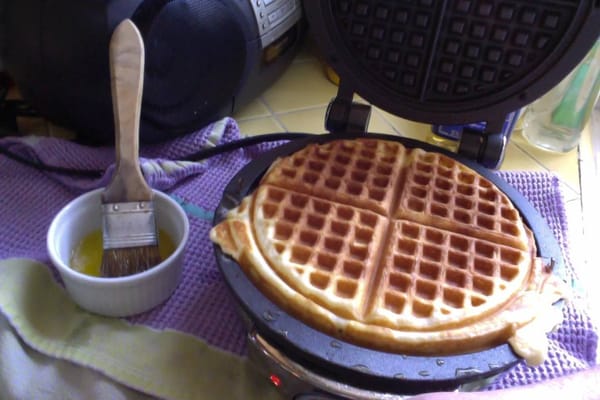That cereal that comes in the bag

In 1983, my mother and stepfather were laid off from their jobs at exactly the same time. We were living in Hobbs, a small town in southeastern New Mexico close to the Texas border, and the town’s recent oil boom was slowing down at a rapid pace. My mother was a secretary for a local oil business and my stepfather was an electrician, so they – and lots of other people who were also losing their jobs – looked for employment elsewhere. The choices came down to Alamogordo or Dallas. I can't remember why. I just knew which one I wanted.
I told my mother, “Could we make the jump to a place where being laid off means there’s another local job available? Eventually we run out of identical small towns in New Mexico.”
My reasoning was not what made them choose Dallas. My aunt and uncle, also affected by the oil bust, had already relocated there. They gave my parents a place to land while jobs and an apartment were found. My younger brother and I stayed behind in Hobbs for the summer, working our own part-time jobs, taking as many extra shifts as we could get, packing up the house for whatever happened next, and helping my parents financially.
That was a new one. We had always been working-class, on the lower middle end of that continuum, and occasionally we'd teeter on the edge of actual poverty, sometimes dip into it, then rise back up a bit. To a self-centered teenager it always just felt like actual poverty, but it had never come to the point where the kids had to pay the utility bills or buy all the groceries. My younger brother and I were, all of a sudden, paying the utilities and buying all the groceries.
My mother and stepfather were scrambling to keep the mortgage going so that the bank wouldn’t take away the house before it could be sold. Do people make money on a house that's sold after only five years of making payments? I don't know. I only know we'd never had much money, and now we had even less.
When teenagers who can’t really cook and don’t have enough money are in charge of the buying their own food, there's a lot of gutter-brand frozen pizza involved. Repo Man-style generic label shit. We looked for deals. We used coupons. We bought the powdered milk and powdered mashed potatoes and boxes of macaroni & cheese and hot dogs. I remember eating up the canned spinach my mom had left behind and then not buying any sort of vegetables for the rest of the summer.
I worked bagging groceries at a neighborhood supermarket and sometimes, at the end of the night, the deli would throw out this or that lunch meat or baked item. If you asked quietly enough, the manager would package it up and hand it off. My younger brother worked at a local discount store stocking shelves. Friday was payday. Some Thursdays the money had run out, with very little left in the refrigerator. Dinner would be a bowl of cereal.
I was also involved with a Baptist church at that time. They did nothing for anyone as far as I could see. Obviously, some others do a lot. But what's missing even now when churches do charity work is the admission that all of them could devote all of their resources to helping the poor, and it still wouldn’t get to everyone in need. Of course, they never have. They don't think it's their job. They can read that book however they like. Back when federal assistance programs started, that's exactly why they started.
Eventually, my family's tide turned. My parents got jobs. The house sold. My brother and I drove his used 1970-something sedan across Texas with a cat in the back seat. I dropped out of my freshman year of college for a semester to work in the warehouse of a catalog company in North Dallas. My brother transferred high schools. We lived in a quite small two-bedroom apartment next to the LBJ Freeway. We had lived in worse. Everything more or less turned out all right.
During this precarious moment, had my parents applied for food stamps, they would have received them. But they didn’t. And since they’re both gone now, I can't ask them what kept them from doing that. Stubbornness most likely.
And now, a little rant to wind this up: People you know have been in this kind of need, and you were unaware because they were afraid to say it out loud or, like my parents, too stubborn. Maybe they heard you express animosity toward federal food assistance. This makes you the problem.
Power is the means to decide who thrives and who suffers. When people have what they need, they're less easily controlled by that power. I've watched conservatives my entire life, and what I've seen is a consistent desire to keep people in line, to keep them from getting something they don't deserve, no matter how small that something might be. They don't want to pay for your groceries. They want to pay for corporate subsidies, or wars, or other forms of brutality. When the poor suffer, they cheer or, more politely, just ignore it.
If you’re one of the people cheering the suffering happening right now in the United States, the deliberate withholding of SNAP benefits to people most in need, if you “like” a post from a politician who says, “the government doesn’t have to feed you,” then I don’t know what to tell you. Even if I know you, I don’t know you.



